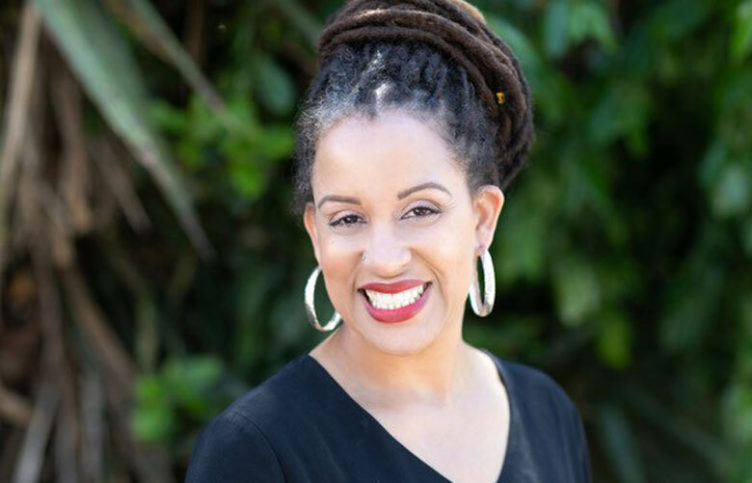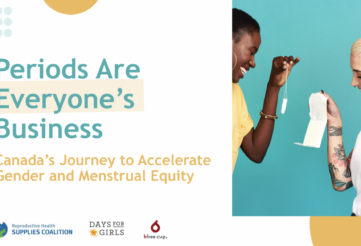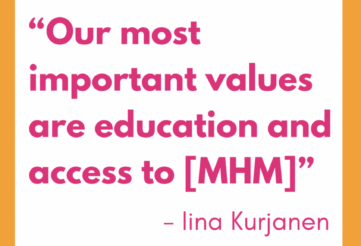Menstrual Equity Interview with Rep. April Berg (D-WA)

This Menstrual Hygiene Day, DfG is shining a light on fierce women leaders paving the way for menstrual equity – and the male allies supporting them along the way.
One of these leaders is Representative April Berg (D-WA), a Washington state legislator who recently championed a bill that requires the provision of free menstrual products all public schools. Under House Bill 1273, which passed with bipartisan support in May 2021, state schools and colleges must provide cost-free menstrual health products in gender-neutral and female bathrooms, starting in the 2022-2023 school year.
“It's important because this is a basic human rights issue. So yes, it's for menstruating individuals, but to me, I always equate it with toilet paper. At no point would you have a discussion with your employer or with your school about should toilet paper be available, or should it not? Is that a male or is that a female issue? No. It's a basic hygiene, humanity issue and that's kind of how we approach menstrual equity for menstruating individuals. And so I think male allyship is important because men have mothers, daughters, female colleagues, etc. that this is an issue for, and I think it really it has to be an all-in approach.” – Rep. April Berg
Jessica Williams
How did you know menstrual equity was an issue that you wanted to tackle when you got into office?
Rep. April Berg
That's a great question. For me, it was easy. I have six kids, three of which are girls. And so when I got elected, literally my girls were like, this would be a great bill! Like, this is an issue for for kids in our school. It was really the access to products, as well as some of the period poverty issues that you see in most American high schools. And so even before the session started, they went on Instagram, and did kind of a poll… like a question, you know, is menstrual equity an issue? Is access to products an issue? And do you have stories about how it's an issue? And I want to say within an hour, they must have had like 80 young women and young menstruating individuals say, yep, it's an issue! But also some stories, like some actual stories, you know, from high school X, high school Y. So from there coming into my first term, as a legislator, I was like, okay, this is an issue. But we're in a virtual session during a public health crisis. And I'm a first term legislator, so I was pretty honest with my girls and said, you know, this might be an issue that mom can tackle in a couple of years. But I know it's an issue. And so that's kind of how I came into it, foundationally. And then from there, I realized I had a lot of allies and advocates in the Senate and in the House, who were also passionate about menstrual equity and eliminated period poverty. So it was kind of an easy lift with my colleagues, after I realized they had interest too.
Jessica Williams
Well, congratulations! And by the way, being the first Black woman to represent the 44th Legislative District of Washington State – that's pretty amazing. And then for you to so quickly pass this bill. That's fantastic. So when you sponsored the bill, how did you recruit men to support it? Did you find it difficult to start the conversation? Maybe you can talk a little bit more about how that played out.
Rep. April Berg
So our state was probably a little unique. We had a bill that was not quite as comprehensive as the one I passed – but we had a bill very similar to it. That passed unanimously in the Senate the previous session. So I was kind of starting from there. And it hadn't made it to the House, kind of a timing thing – we're one of those states where we have a legislative session with 105 days to get it done, or you don't get it done. So it kind of timed out. So I started from with that bill. But some of the changes I made were making it a little more inclusive in terms of language, including gender neutral bathrooms, but also making it not just K-12, but all the way up through our community and technical colleges, as well as our four-year colleges. So I knew it had support from both men and women because of that support on the Senate side. And I'll just be frank, I started with my colleagues on the House side, and most of us were women who originally signed on. And once the bill is “dropped,” other members have an opportunity to sign on and say, yep, we support it. And there were male colleagues that signed on without prompting, which I thought was amazing and great. And just kind of a testament to where the conversation has moved to in 2021. So long story short, it was not a heavy lift to to get male colleagues to support it. There were no complicated conversations. And even as it passed through committee, my male colleagues were very, very supportive. Both sides of the aisle – it was bipartisan all the way of having this passed.
Jessica Williams
Amazing. I'm so happy to hear that I know. So in your experience, obviously male allyship played a key role. So I'm guessing your opinion on this question is yes, male allyship is important when it comes to menstrual equity. But why do you think it's important?
Rep. April Berg
Male allyship? You know, it's important because this is a basic human rights issue. Right? So yes, it's for menstruating individuals, but to me, I always equate it with toilet paper. At no point would you have a discussion with your employer or with your school about should toilet paper be available, or should it not? Is that a male or is that a female issue? No. It's a basic hygiene, humanity issue and that's kind of how we approach menstrual equity for menstruating individuals. And so I think male allyship is important because men have mothers, daughters, female colleagues, etc. that this is an issue for, and I think it really it has to be an all-in approach. This is not an issue that I've seen, at least in our state. And again, I'm very lucky to be in Washington state where this did not trigger some kind of gender war about necessity. And I will tell you, it was very refreshing to not even have to go down the path of “why is this necessary?” with my male colleagues. Yeah, lucky to live in a state where that is the case.
But on that same note, another piece of it is that so much of the advocacy, both with the original bill last session, and the one that passed this session, came from students. So we had students, young menstruating individuals in high school and in college, doing the advocacy work, and telling their stories. And I really do think that helped my male allies, my male colleagues, really understand and see the necessity of it. One story that a a young lady who was testifying shared, was about a friend of hers who was taking a high stakes test, and started menstruating during the test. A part of the requirements is that you can't go back to your backpack, right? Like, you might be cheating if you go grab something from your backpack. So her only option at that point was to go to the bathroom, which did not have period products for free. And she couldn't go into her backpack to get a coin or anything to get them or to get a product from her backpack. So she had to sit there through this test, clearly not concentrating on the test on the first day of her period. And I think when that story was told, much more eloquently than I just related, you can see on some of my colleagues faces, my male colleagues going, whoa, like what would you do in that scenario? And she did the only thing she could do, was just get through the test. She bled, and then she got up and cleaned herself up. And that all could have been avoided had she had free access to menstrual products in the bathroom, which she would have been allowed to go to.
Jessica Williams
You know, I've heard that from a lot of men. Once they hear stories like that from women or girls, it's almost like they put themselves…like, what if that was my sister or my daughter? And it's an “aha!”
Rep. April Berg
It's an “ohhh” and an “aha!” moment all at the same time. And, you know, this was a virtual session, so depending on what cameras are on, you can kind of see it real time happen, right? And that's kind of interesting.
Jessica Williams
Awesome. I love that. How do you think we can include men and boys in the conversation more about menstrual health and menstrual equity and period poverty? Like, what are some of the ways that you think we can invite them into that work?
Rep. April Berg
Yeah, that's a great question. I was really excited about how many male advocates we had come out. And not so much testify for the bill. But being in kind of our stakeholder-verse as we talked about the bill. And what I realized was, there are a lot of young men who were in period clubs, in menstrual equity clubs, either at their high schools or in their colleges. And I thought, what a great way to include men in this conversation. And so I think that's a big piece of it. The other piece, I think that's really helped – and of course, I don't have any data around it, but with my bill, the language was very gender-inclusive. And so this was for menstruating individuals. And that even goes so far as to say, if you don't have a gender neutral bathroom on your campus, or in your facility, that there needs to be a men's room that has this product available, right. And so now all of a sudden, you're talking about men's rooms, and you're bringing them into the conversation, because this is going to be potentially something that's in a space that they're in. And so I think that that brings them in in a different way that maybe wasn't thought of before. And so it's not – for our for our bill, it's not every men's room, but if this is not available in a gender neutral bathroom, then one of the men's rooms is going to have to have these products available. And again, the men are now brought into the conversation because you know, what I've seen, especially with our younger generation, and our students, they want to be inclusive, they want to help and they were… it was kind of, again, that “aha!” moment for some of our male allies. Yeah, we need these in our rooms as well, because we may have menstruating individuals that are utilizing our bathrooms.
Jessica Williams
Oh, that's so interesting. Do you have any advice for women who are seeking the support of male allies and their menstrual health efforts?
Rep. April Berg
So you know, it's hard to give advice because I think everybody is on such a unique journey as we talk about menstrual health and we talk about menstrual equity. And I always, you know, I probably hang out with a lot of folks who are considered, I guess, if you sit on the political spectrum, progressive, right? But you'll sometimes even see, you know, women kind of go – I'll start talking, and they'll say, oh, what bills are you most proud? And I'm like my period bill! And they're just like, whoa, whoa, whoa. So I think in terms of including male allies, you really have to do it in a way that you're most comfortable. So I think for women and as menstruating individuals, we always have to do what's most comfortable for us. For me, it's just talking in plain language, about menstruation, and about our bodies and what happens each month. For other women, it might not be that – it might be something different. It might be maybe around policy, around stories, like we talked about earlier, or around, you know, placement and what that looks like. So I think the biggest thing, the biggest piece of advice I can give those is to talk about it. Right? Don't go outside of your comfort zone, don't feel like it has to be something that you're nervous about. But I do think that as we as we go down this journey of really being honest with ourselves, right, especially in a post-COVID environment, where we're now very comfortable saying the quiet parts out loud, about everything from, you know, food security, to housing security, behavioral mental health – talking about periods, menstruation, and period period should not be something that we shy away from. But definitely do it within your own comfort zone.
Jessica Williams
Great. And my last question is, what's next for you? I know equity and inclusion is is an important issue for you. So what should we look forward to seeing from you in the future?
Rep. April Berg
There's a lot! There's talking specifically around menstruation. I think I would love to start working with the same allies. I got this bill passed about talking about our other facilities, public restrooms, public facilities, making menstruation products readily available. I think ending period poverty is a really big task. And this is the first step. Actually, probably the second step, we got rid of the pink tax last session. So now we've got products available for our students. I think that we still need to keep moving on the path when it comes to menstrual equity. And I think when it comes to gender inclusion, another step that I really see is necessary is making sure that all of our campuses have gender neutral bathrooms. Because that was one piece that folks really spoke up about and said, look, we've got a lot of spaces where we don't have gender neutral bathrooms. So I think that would be a next step kind of down the path of equity. And then of course, as we talk about equity and education, we always go back to understanding what that means historically. And so working with leaders – working with state leaders, but also local leaders, local school boards – making sure we have inclusive history lessons, ethnic studies available, and really talking about equity, you know, at a foundational systemic point, because I think that will only bear good fruit for our future leaders.









